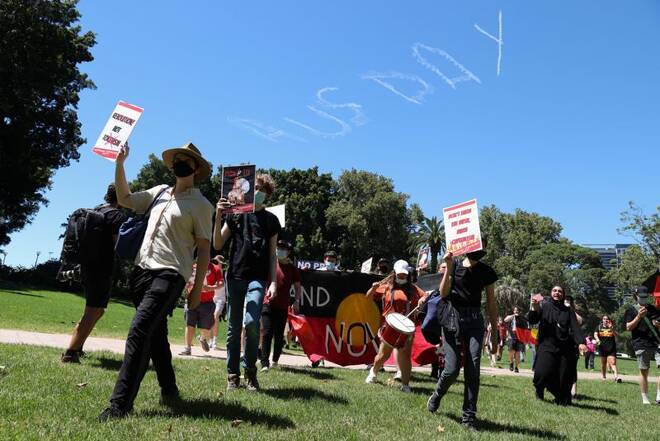Advertisement
Advertisement
Thousands rally for ‘Invasion Day’ protests on Australia Day holiday
By:
SYDNEY (Reuters) - Thousands of Australians marked the country's national holiday on Thursday with rallies in support of the nation's Indigenous people, many of whom describe the anniversary of the day a British fleet sailed into Sydney Harbour as "Invasion Day".
SYDNEY (Reuters) -Thousands of Australians marked the country’s national day celebrations on Thursday with rallies in support of Indigenous people, many of whom describe the anniversary of the day a British fleet sailed into Sydney Harbour as “Invasion Day”.
In Sydney, the capital of New South Wales – Australia’s most populous state – social media showed a large crowd gathered at an “Invasion Day” rally in the central business district, where some people carried Aboriginal flags and an Indigenous smoking ceremony took place.
Similar protests took place in other Australian state capitals, including in South Australia’s Adelaide where around 2,000 people attended, according to the Australian Broadcasting Corporation.
Speaking at a flag-raising and citizenship ceremony in Australia’s capital, Canberra, Prime Minister Anthony Albanese honoured the nation’s Indigenous people, who have occupied the land for at least 65,000 years.
“Let us all recognise the unique privilege that we have to share this continent with the world’s oldest continuous culture,” Albanese said.
While it was a “difficult day” for Indigenous Australians, there were no plans to change the holiday’s date, he said.
An annual poll by market research company Roy Morgan released this week showed nearly two-thirds of Australians say Jan. 26 should be considered “Australia Day”, largely unchanged from a year ago. The rest believe it should be “Invasion Day”.
Amid the debate, some companies have adopted flexibility around observance of the holiday. Australia’s largest telecoms company, Telstra Corp Ltd, this year gave its staff the option to work on Jan. 26 and take another day off instead.
“For many First Nations peoples, Australia Day … marks a turning point that saw lives lost, culture devalued, and connections between people and places destroyed,” Telstra chief executive officer Vicki Brady wrote on LinkedIn.
Many of Australia’s 880,000 or so Indigenous people out of a population of 25 million lag behind others on economic and social indicators in what the government calls “entrenched inequality”.
This year’s holiday comes as Albanese’s centre-left Labor Party government plans a referendum on recognising Indigenous people in the constitution, and requiring consultation with them on decisions that affect their lives.
The government plans to introduce legislation in March to set up the referendum that will take place later this year, as the Indigenous voice shapes as a key federal political issue.
The constitution, which came into effect in January 1901 and can’t be amended without a referendum, does not refer to the country’s Indigenous people.
One of the people at Sydney’s protest, Abi George, said it was not a happy day for all Australians, especially Indigenous people.
“Nobody’s got the right to celebrate genocide,” she said.
Another protester, Vivian Macjohn, said the rally against the national day was a show of support for Indigenous people.
“I think it’s important that we show up and we mourn with them and stand in solidarity,” she said.
(Reporting by Sam McKeith and Cordelia Hsu; Editing by Kenneth Maxwell and Raju Gopalakrishnan)
About the Author
Reuterscontributor
Reuters, the news and media division of Thomson Reuters, is the world’s largest international multimedia news provider reaching more than one billion people every day. Reuters provides trusted business, financial, national, and international news to professionals via Thomson Reuters desktops, the world's media organizations, and directly to consumers at Reuters.com and via Reuters TV. Learn more about Thomson Reuters products:
Latest news and analysis
Advertisement
